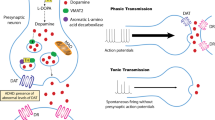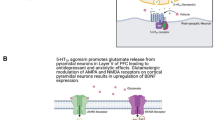Abstract
Rationale
Glibenclamide (GD) is a widely used medical drug; therefore, identifying the mechanisms underlying its pleiotropic effects in the central nervous system is urgent.
Objectives
The aim of this work was to determine the ability of GD to modulate serotonin (5-hydroxytryptamine, 5-HT) and dopamine (DA) transmission and to assess the dose-dependent effect of GD on cognitive function in rats during natural ageing.
Methods
In Experiment 1, rats received 10, 25, or 50 μg/kg GD intraperitoneally for 10 days. In Experiment 2, rats received 50 μg/kg GD intraperitoneally for 30 days. Spatial and working memory was assessed in the MWM and Y-maze tests, respectively. In both experiments, the levels of DA and 5-HT, their metabolites, and turnover rate were analysed by HPLC-ED in the rat hippocampus and striatum.
Results
Changes in DA and 5-HT levels occurred only with a dose of 50 μg/kg GD. Therefore, in the second experiment, we administered a dose of 50 μg/kg GD. At this dose, GD prevented the development of impairments in spatial and working memory. The hippocampal concentrations of DA and DOPAC decreased, and the striatal concentrations of DA, DOPAC, 5-HT, and 5-HIAA increased.
Conclusion
One of the possible mechanisms of the precognitive effect of GD is its ability to modulate monoamine transmission. Thus, in translating our results to humans, GD can be recommended as a prophylactic agent for natural ageing to reduce the risk of developing cognitive impairments.









Similar content being viewed by others
Data availability
The data that support the findings of this study are available from the corresponding author, D. S. Traktirov, upon reasonable request.
References
Alhowail A (2021) Molecular insights into the benefits of nicotine on memory and cognition (review). Mol Med Rep 23(6):398. https://doi.org/10.3892/mmr.2021.12037
Atherton LA et al (2015) Memory trace replay: the shaping of memory consolidation by neuromodulation. Trends Neurosci 38(9):560–570. https://doi.org/10.1016/j.tins.2015.07.004
Avshalumov MV, Rice ME (2003) Activation of ATP-sensitive K+ (K(ATP)) channels by H2O2 underlies glutamate-dependent inhibition of striatal dopamine release. Proc Natl Acad Sci U S A 100(20):11729–11734. https://doi.org/10.1073/pnas.1834314100
Babenko AP et al (1998) A view of sur/KIR6.X, KATP channels. Annu Rev Physiol 60:667–687. https://doi.org/10.1146/annurev.physiol.60.1.667
Bao L et al (2005) Partial mitochondrial inhibition causes striatal dopamine release suppression and medium spiny neuron depolarization via H2O2 elevation, not ATP depletion. J Neurosci 25(43):10029–10040. https://doi.org/10.1523/JNEUROSCI.2652-05.2005
Buhot MC et al (2003) Spatial learning in the 5-HT1B receptor knockout mouse: selective facilitation/impairment depending on the cognitive demand. Learn Mem 10(6):466–477. https://doi.org/10.1101/lm.60203
Cools R (2011) Dopaminergic control of the striatum for high-level cognition. Curr Opin Neurobiol 21(3):402–407. https://doi.org/10.1016/j.conb.2011.04.002
Cools R, D’Esposito M (2011) Inverted-U-shaped dopamine actions on human working memory and cognitive control. Biol Psychiatry 69(12):e113–e125. https://doi.org/10.1016/j.biopsych.2011.03.028
Dawson LA, Routledge C (1995) Differential effects of potassium channel blockers on extracellular concentrations of dopamine and 5-HT in the striatum of conscious rats. Br J Pharmacol 116(8):3260–3264. https://doi.org/10.1111/j.1476-5381.1995.tb15133.x
Di Matteo V et al (2008) Serotonin control of central dopaminergic function: focus on in vivo microdialysis studies. Prog Brain Res 172:7–44. https://doi.org/10.1016/S0079-6123(08)00902-3
Dunn-Meynell AA et al (1998) Distribution and phenotype of neurons containing the ATP-sensitive K+ channel in rat brain. Brain Res 814(1–2):41–54. https://doi.org/10.1016/s0006-8993(98)00956-1
Esmaeili MH et al (2020) Glibenclamide mitigates cognitive impairment and hippocampal neuroinflammation in rats with type 2 diabetes and sporadic Alzheimer-like disease. Behav Brain Res 379:112359. https://doi.org/10.1016/j.bbr.2019.112359
Gibbs SEB, D’Esposito M (2005) Individual capacity differences predict working memory performance and prefrontal activity following dopamine receptor stimulation. Cogn Affect Behav Neurosci 5(2):212–221. https://doi.org/10.3758/cabn.5.2.212
Goodman J, Packard MG (2018) The role of the dorsal striatum in extinction: a memory systems perspective. Neurobiol Learn Mem 150:48–55. https://doi.org/10.1016/j.nlm.2018.02.028
Groop LC et al (1991) Dose-dependent effects of glyburide on insulin secretion and glucose uptake in humans. Diabetes Care 14(8):724–727. https://doi.org/10.2337/diacare.14.8.724
Guerrero et al (2020) Serotonin and noradrenaline content and release in the dorsal hippocampus during learning and spatial memory in prenatally stressed rats. Acta Neurobiol Exp (wars) 80(4):400–410
Gutierrez A et al (2018) A single high dose of methamphetamine reduces monoamines and impairs egocentric and allocentric learning and memory in adult male rats. Neurotox Res 33(3):671–680. https://doi.org/10.1007/s12640-018-9871-9
Hugo J, Ganguli M (2014) Dementia and cognitive impairment: epidemiology, diagnosis, and treatment. Clin Geriatr Med 30(3):421–442. https://doi.org/10.1016/j.cger.2014.04.001
Kalaria RN et al (2016) Stroke injury, cognitive impairment and vascular dementia. Biochim Biophys Acta 1862(5):915–925. https://doi.org/10.1016/j.bbadis.2016.01.015
Kempadoo KA et al (2016) Dopamine release from the locus coeruleus to the dorsal hippocampus promotes spatial learning and memory. Proc Natl Acad Sci U S A 113(51):14835–14840. https://doi.org/10.1073/pnas.1616515114
Knobelman DA et al (2000) Regulation of extracellular concentrations of 5-hydroxytryptamine (5-HT) in mouse striatum by 5-HT(1A) and 5-HT(1B) receptors. J Pharmacol Exp Ther 292(3):1111–1117
Kurian MA et al (2011) The monoamine neurotransmitter disorders: an expanding range of neurological syndromes. Lancet Neurol 10(8):721–733. https://doi.org/10.1016/S1474-4422(11)70141-7
Kurzina NP et al (2020) Deficit in working memory and abnormal behavioral tactics in dopamine transporter knockout rats during training in the 8-arm maze. Behav Brain Res 390:112642. https://doi.org/10.1016/j.bbr.2020.112642
Landau SM et al (2009) Striatal dopamine and working memory. Cereb Cortex 19(2):445–454. https://doi.org/10.1093/cercor/bhn095
Lao Y et al (2021) Association between alcohol intake, mild cognitive impairment and progression to dementia: a dose-response meta-analysis. Aging Clin Exp Res 33(5):1175–1185. https://doi.org/10.1007/s40520-020-01605-0
McNab F, Klingberg T (2008) Prefrontal cortex and basal ganglia control access to working memory. Nat Neurosci 11(1):103–107. https://doi.org/10.1038/nn2024
McNamara CG, Dupret D (2017) Two sources of dopamine for the hippocampus. Trends Neurosci 40(7):383–384. https://doi.org/10.1016/j.tins.2017.05.005
Mei Y et al (2015) Aging-associated formaldehyde-induced norepinephrine deficiency contributes to age-related memory decline. Aging Cell 14(4):659–668. https://doi.org/10.1111/acel.12345
Moukhles H et al (1997) Quantitative and morphometric data indicate precise cellular interactions between serotonin terminals and postsynaptic targets in rat substantia nigra. Neuroscience 76(4):1159–1171. https://doi.org/10.1016/s0306-4522(96)00452-6
Murata M (2013) Surface modification of liposomes using polymer-wheat germ agglutinin conjugates to improve the absorption of peptide drugs by pulmonary administration. J Pharm Sci 102(4):1281–1289. https://doi.org/10.1002/jps.23463
Nazar M et al (1999) The role of the hippocampus and 5-HT/GABA interaction in the central effects of benzodiazepine receptor ligands. J Neural Transm (vienna) 106(5–6):369–381. https://doi.org/10.1007/s007020050165
Packard MG, Knowlton BJ (2002) Learning and memory functions of the basal ganglia. Annu Rev Neurosci 25:563–593. https://doi.org/10.1146/annurev.neuro.25.112701.142937
Paitel ER et al (2021) A systematic review of cognitive event-related potentials in mild cognitive impairment and Alzheimer’s disease. Behav Brain Res 396:112904. https://doi.org/10.1016/j.bbr.2020.112904
Patel AD et al (2010) Glibenclamide reduces hippocampal injury and preserves rapid spatial learning in a model of traumatic brain injury. J Neuropathol Exp Neurol 69(12):1177–1190. https://doi.org/10.1097/NEN.0b013e3181fbf6d6
Paul CA et al (2008) Dissection of rat brains. CSH Protoc: pdb.prot4803. https://doi.org/10.1101/pdb.prot4803
Paxinos G, Watson C (2013) The rat brain in stereotaxic coordinates, 7th edn. Academic Press, Amsterdam
Pestereva N et al (2021) m-Calpain is released from striatal synaptosomes. Int J Neurosci. https://doi.org/10.1080/00207454.2021.1901697
Qiu X et al (2021) Inhibition of NLRP3 inflammasome by glibenclamide attenuated dopaminergic neurodegeneration and motor deficits in paraquat and maneb-induced mouse Parkinson’s disease model. Toxicol Lett 349:1–11. https://doi.org/10.1016/j.toxlet.2021.05.008
Ren A et al (2016) CD200 Inhibits inflammatory response by promoting KATP channel opening in microglia cells in Parkinson’s disease. Med Sci Monit 22:1733–41. https://doi.org/10.12659/msm.898400
Rosado AF et al (2021) Glibenclamide treatment prevents depressive-like behavior and memory impairment induced by chronic unpredictable stress in female mice. Behav Pharmacol 32(2&3):170–181. https://doi.org/10.1097/FBP.0000000000000599
Roth BL et al (2004) Serotonin receptors represent highly favorable molecular targets for cognitive enhancement in schizophrenia and other disorders. Psychopharmacology 174(1):17–24. https://doi.org/10.1007/s00213-003-1683-8
Sarookhani MR et al (2018) Involvement of adenosine triphosphate-sensitive potassium channels in the neuroprotective activity of hydrogen sulfide in the 6-hydroxydopamine-induced animal model of Parkinson’s disease. Behav Pharmacol 29(4):336–343. https://doi.org/10.1097/FBP.0000000000000358
Slingerland AS et al (2008) Sulphonylurea therapy improves cognition in a patient with the V59M KCNJ11 mutation. Diabet Med 25(3):277–281. https://doi.org/10.1111/j.1464-5491.2007.02373.x
Solé B et al (2017) Cognitive impairment in bipolar disorder: treatment and prevention strategies. Int J Neuropsychopharmacol 20(8):670–680. https://doi.org/10.1093/ijnp/pyx032
Soliman E et al (2020) Impact of some oral hypoglycemic agents on type 2 diabetes-associated depression and reserpine-induced depression in rats: the role of brain oxidative stress and inflammation. Naunyn Schmiedebergs Arch Pharmacol 393(8):1391–1404. https://doi.org/10.1007/s00210-020-01838-w
Sood A, Raji MA (2021) Cognitive impairment in elderly patients with rheumatic disease and the effect of disease-modifying anti-rheumatic drugs. Clin Rheumatol 40(4):1221–1231. https://doi.org/10.1007/s10067-020-05372-1
Stern SA, Alberini CM (2013) Mechanisms of memory enhancement. Wiley Interdiscip Rev Syst Biol Med 5(1):37–53. https://doi.org/10.1002/wsbm.1196
Stokum JA et al (2017) Glibenclamide pretreatment protects against chronic memory dysfunction and glial activation in rat cranial blast traumatic brain injury. Behav Brain Res 333:43–53. https://doi.org/10.1016/j.bbr.2017.06.038
Teixeira CM et al (2018) Hippocampal 5-HT input regulates memory formation and Schaffer collateral excitation. Neuron 98(5):992-1004.e4. https://doi.org/10.1016/j.neuron.2018.04.030
Tseilikman V et al (2020) High and low anxiety phenotypes in a rat model of complex post-traumatic stress disorder are associated with different alterations in regional brain monoamine neurotransmission. Psychoneuroendocrinology 117:104691. https://doi.org/10.1016/j.psyneuen.2020.104691
van de Giessen E et al (2017) Deficits in striatal dopamine release in cannabis dependence. Mol Psychiatry 22(1):68–75. https://doi.org/10.1038/mp.2016.21
Vorhees CV, Williams MT (2014) Assessing spatial learning and memory in rodents. ILAR J 55(2):310–332. https://doi.org/10.1093/ilar/ilu013
Wang FX et al (2020) Norepinephrine in the dentate gyrus is involved in spatial learning and memory alteration induced by chronic restraint stress in aged rats. NeuroReport 31(18):1308–1314. https://doi.org/10.1097/WNR.0000000000001547
Wilkinson L et al (2014) Probabilistic classification learning with corrective feedback is associated with in vivo striatal dopamine release in the ventral striatum, while learning without feedback is not. Hum Brain Mapp 35(10):5106–5115. https://doi.org/10.1002/hbm.22536
World Health Organization (1948) Dementia. https://www.who.int/news-room/fact-sheets/detail/dementia. Accessed 13 March 2020
Xiao LY et al (2018) Acupuncture rescues cognitive impairment and upregulates dopamine-β-hydroxylase expression in chronic cerebral hypoperfusion rats. Biomed Res Int 2018:5423961. https://doi.org/10.1155/2018/5423961
Yoon SY et al (2013) Oroxylin A improves attention deficit hyperactivity disorder-like behaviors in the spontaneously hypertensive rat and inhibits reuptake of dopamine in vitro. Arch Pharmacal Res 36(1):134–140. https://doi.org/10.1007/s12272-013-0009-6
Zameer S et al (2019) Behavioral experimental paradigms for the evaluation of drug’s influence on cognitive functions: interpretation of associative, spatial/nonspatial and working memory. CNS Neurol Disord Drug Targets 18(3):185–204. https://doi.org/10.2174/1871527318666190112143834
Zhang L et al (2020) Neuroprotective effect of different physical exercises on cognition and behavior function by dopamine and 5-HT level in rats of vascular dementia. Behav Brain Res 388:112648. https://doi.org/10.1016/j.bbr.2020.112648
Zubov A et al (2020) Glibenclamide as a neuroprotective antidementia drug. Arch Physiol Biochem. https://doi.org/10.1080/13813455.2020.1789170
Funding
This work was supported by the Russian Foundation for Basic Research under Grant 20–015-00168.
Author information
Authors and Affiliations
Corresponding author
Ethics declarations
Conflict of interest
The authors declare no competing interests.
Additional information
Publisher's note
Springer Nature remains neutral with regard to jurisdictional claims in published maps and institutional affiliations.
Supplementary Information
Below is the link to the electronic supplementary material.
Rights and permissions
About this article
Cite this article
Zubov, A., Ivleva, I., Pestereva, N. et al. Glibenclamide alters serotonin and dopamine levels in the rat striatum and hippocampus, reducing cognitive impairment. Psychopharmacology 239, 2787–2798 (2022). https://doi.org/10.1007/s00213-022-06159-9
Received:
Accepted:
Published:
Issue Date:
DOI: https://doi.org/10.1007/s00213-022-06159-9




